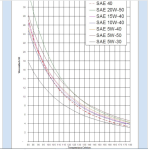Where are you located? You got some advice to use 0W40 oil. That was bad advice. It is too thin for 6.0
1. Change oil at 5,000 mile intervals religiously.
2. Ford recommends 15W40 that matches Ford specification WSS-M2C171-D, CI-4/SL, DHD-1. Part #XO-15W40-QSD or XO-10W30-QSD Don't go below 10W30. Engine bearings are expensive to replace. If you are up north get a block heater. Here in South Texas the cold oil viscosity is not important.
3. NEVER change the coolant to anything other than Ford Premium Gold. It is pricey but anything else will corrode holes in your oil cooler which puts oil in the cooling system. That is a royal pain to repair. Not a good thing. Ford Spec WSS-M97B51-A1, Part# VC-7-A
4. There are 2 different oil filters in the marketplace. Some aftermarket ones are taller and come with a taller cap. Using a FOMCO filter with an aftermarket cap allows oil to bypass the filter.
5. Your FICM voltage is within spec. If you have a hard-starting problem the first thing to look at are the plugs in the back of the FICM. The plastic clips that hold the plugs in have a tendency to break down in the heat of the engine compartment.
6. Speaking of heat - excessive idling damages the wiring on top of the engine, especially the injector wiring harness due to excess heat. Idling is not good for the life of the oil either.
7. I see you have a glow plug out. Not a problem if it starts. That cylinder may not kick off right away but will pick up when the engine warms for a few minutes. They are a pain to change. Here in South Texas we hardly ever need to use glow plugs. My wait to start light hardly ever came on.
8. I installed a Atoto A6 head unit in '03. It worked well.
You can download an owner's manual and the diesel supplement from Ford if you don't have them.
1. Change oil at 5,000 mile intervals religiously.
2. Ford recommends 15W40 that matches Ford specification WSS-M2C171-D, CI-4/SL, DHD-1. Part #XO-15W40-QSD or XO-10W30-QSD Don't go below 10W30. Engine bearings are expensive to replace. If you are up north get a block heater. Here in South Texas the cold oil viscosity is not important.
3. NEVER change the coolant to anything other than Ford Premium Gold. It is pricey but anything else will corrode holes in your oil cooler which puts oil in the cooling system. That is a royal pain to repair. Not a good thing. Ford Spec WSS-M97B51-A1, Part# VC-7-A
4. There are 2 different oil filters in the marketplace. Some aftermarket ones are taller and come with a taller cap. Using a FOMCO filter with an aftermarket cap allows oil to bypass the filter.
5. Your FICM voltage is within spec. If you have a hard-starting problem the first thing to look at are the plugs in the back of the FICM. The plastic clips that hold the plugs in have a tendency to break down in the heat of the engine compartment.
6. Speaking of heat - excessive idling damages the wiring on top of the engine, especially the injector wiring harness due to excess heat. Idling is not good for the life of the oil either.
7. I see you have a glow plug out. Not a problem if it starts. That cylinder may not kick off right away but will pick up when the engine warms for a few minutes. They are a pain to change. Here in South Texas we hardly ever need to use glow plugs. My wait to start light hardly ever came on.
8. I installed a Atoto A6 head unit in '03. It worked well.
You can download an owner's manual and the diesel supplement from Ford if you don't have them.







